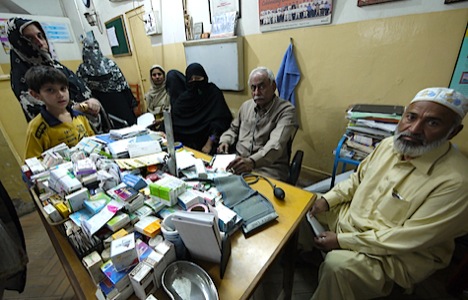 Image courtesy of Panthea Lee
Image courtesy of Panthea Lee
Panthea Lee, co-founder of Reboot, spoke today about post-disaster work in Pakistan at the A Better World by Design conference at RISD/Brown. Reboot works with governments and social institutions to redesign their systems and services. Lee is a game-changer to watch in the newest generation of social designer-innovator-entrepreneurs.
Core77: How did you get involved in working with international governments?
Panthea Lee: All my life I had wanted to be a journalist, I grew up writing: done deal. I was all psyched to go to journalism school, had my bags packed, and then my parents go, 'We did not immigrate to Canada and struggle for twenty years as poor immigrants so that you could go on and be a starving journalist!' So I wound up in business school. After that, I did the business school job for a while in management and consulting, then went off to China to go be a journalist.
I was traveling a lot in the developing world. Being young and stupid, you're like, 'Why does stuff not work? Why don't people have things? Why don't people have food and healthcare systems?' So I started reading up on development and trying to understand the structural aspects of what was going on. I think it started out of youthful anger and then instead of just reporting about social problems, why not try to work on social problems?
 Image courtesy of Panthea Lee
Image courtesy of Panthea Lee
Prior to Reboot, you spent time working with UNICEF and other NGO's. What did you learn?
I think we've agreed that capitalism is not going away in the near term, so what is the role of big business and how do you do development sustainably? If they actually treated poor people as actual customers instead of people who just wanted aid, they would actually design things that people wanted. You realize that in the public sector and in NGO's there's no accountability.
So a company makes a lousy product. They put it out to market and people don't like it and the company has to make a better product otherwise they go out of business. With a lot of these NGO's, people assume they're doing a lot of good work and then they design a program poorly or design a bad service and they put it out there and beneficiaries have to use it because they don't have any other options. There's no accountability.
 Image courtesy of Panthea Lee
Image courtesy of Panthea Lee
So what skills do you bring to the table? You're not exactly your average designer...
I think I bring the understanding of the development practitioners and the policy makers. Design for social change is a very "sexy" topic and you see a lot of design firms now going to the public sector and to NGO's saying, 'We're designers, we're here to help you!' And they're like, 'What are you talking about? You don't speak our language, you don't know development theory, you don't know our approach.' It helps to know why things are the way they are today because so much of the time you see people jumping in and saying, 'We're going to design for change and things are going to be better.'
But what's the context around why we have these problems to begin with? What has already been tried? I think design firms—well-intended, very talented—don't always understand that and so I think governments look at them a little weirdly. With most of the people from Reboot, we come from those kinds of organizations and we know what we don't know. I think that is an advantage for us.
 Image courtesy of Panthea Lee
Image courtesy of Panthea Lee